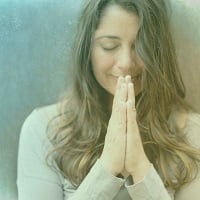This article is created in partnership with Ana Verzone, host of the Rebel Buddhist podcast and a spiritual mindset coach for freedom seekers. She is dedicated to giving us the tools we need to live our most adventurous and mindful lives. We’re honored to work with her. ~ ed.
Do I have a drinking problem?
If you drink more than you want, then the answer is…yes.
I’ve been there.
I went from a “sometimes” drinker in my 20s (mostly because I couldn’t afford it more often) to drinking most nights a week in my 30s (which started while dating an alcoholic).
Drinking didn’t have many bad consequences for me other than a few “WTF happened last night?” moments. I generally had a good time when I drank and could bounce back easily the next day. I never drank to feel better; it was something I just did for fun, until…
I became a mom and had to juggle multi-passionate careers and a doctoral program with being stuck at home, unable to do the things that usually got my mind to a better place, like get to that yoga class or run up that steep hill in the mountains. I tried everything I could think of to relax while at home with a baby, but no matter what I tried, I was still left feeling bored or anxious or restless.
Then, one day, I decided to have a glass of that half bottle of sauvignon blanc in the fridge at 5 p.m. I felt really relaxed, so I had another.
The next day, I did that again…
That was the beginning of drinking more regularly, but still functioning quite well. I exercised, traveled, excelled in my career, and even got that doctoral degree.
But when I turned 40, drinking started to affect my health. I got crappy sleep. I felt worse the next day. I had a foggy brain after the big nights. I couldn’t get off the couch and go for that mountain bike ride that would clear my head like it used to.
Why it’s so hard to drink less (even when it makes us feel bad)
Get my Free Video Training, 3 Steps to Drink Less >>
The thing is, I had no problem with not drinking at all when I wanted to. What I sucked at was drinking less when I wanted to.
Let me tell you why that’s a problem, and how I found my way out of it, without quitting altogether. Well, not unless I decided to.
If you’re an overdrinker, but not an alcoholic—as I was—there is a middle way.
I’m a Rebel Buddhist (basically the naughty, sweary wanna-be Pema), so the middle way is totally my jam: it means I can still enjoy a drink, but I can also stay in control of my drinking. I can drink moderately, or I can quit completely—whatever feels right to me.
You might call this way How to Drink like a Buddhist.
What exactly is the problem with drinking regularly and maybe having a few too many drinks occasionally?
For me, drinking less = feeling free. I’ve come way too far on the path to freeing my mind and freeing my life to let something like drinking more than I want trap me somewhere I don’t want to be.
You see, anytime we do something that we don’t want to do, we have a problem.
But problems are also a part of life, and what I love about problems is that solving them can be a huge part of our personal evolution.
The problem isn’t that something is broken in us. It’s simply that we’ve programmed our unconscious brain to desire alcohol more than our conscious, higher-functioning brain wants it.
So, I drew on everything I’ve learned as a Climbing Guide, Master Certified Life Coach, Mindfulness Meditation Teacher, Integrative Nurse Practitioner, and all-round Freedom Junkie to help myself conquer this problem of overdrinking.
Learn why we over-desire drinking & how to stop:
Get my Free Training Video >>
And I put all those tools together for other adventurous, freedom-lovers like me, in my Drink Less Feel Free course.
When it comes to problems, there is math…and then there is drama.
I’m guessing it’s the drama that has most likely caused you to experience negative results from drinking. I know it did for me. But here’s the cool thing:
It’s just math.
Problem: Too many drinks = unwanted consequences.
Solution: Want fewer drinks = drinking fewer drinks.
Of course, behind this fundamentally simple math problem are a lot of inner workings. It takes learning how to manage our minds, which can be much messier than a simple math equation.
But you can actually learn how to want it less. Then, practice and repeat.
Problems can be solved, but often it’s the story we tell ourselves around the problem that gets us stuck never feeling like we can figure it out.
I encourage you to stick with the math and focus on what’s going on behind a problem when trying to solve it, rather than the dramatic story we and others around us can weave around the root issue. It is waaaay more freeing.
But how do I know if I need to quit cold turkey, or just moderate my drinking?
That is, of course, completely up to you. But let me give you my two cents…
If you think you overdrink, you will want to drink less. The way I teach you how to do that includes drinking in moderation.
It includes desiring less alcohol, as I teach in Step #1 of my free video training, and in more detail in Drink Less Feel Free.
Once I understood the root of my urge to overdrink, I could learn how to manage that urge, move from judgment to curiosity about my behavior, and the feelings and thoughts underlying that behavior—my “drinking thinking”—without fighting myself the whole way.
Many of my students give up drinking when they desire it less; it’s just not worth it to them to keep drinking. Others plan their drinking and enjoy a few drinks here and there.
Personally, I didn’t like the chatter that went on in my brain around drinking.
I didn’t like spending my brain energy on deciding when, how much, and if I would drink. It eventually became uninteresting to me.
I wanted to use my brainpower on something else.
So make that decision when you get there. When you can take it or leave it is when you will make a clear decision on how much to drink.
How will I know if it’s the right decision? If it feels like freedom, you are doing it right.
There’s a difference between freedom to and freedom from.
I don’t advocate one way or the other when it comes to quitting or cutting down because I know that only you can decide what’s right for you.
But the truth is most of us still have some work to do before we even know what’s right for us. (I also teach that in my course.) And also, what’s right for you may change, and that’s okay.
What I want to help you do is get underneath all that inner chatter, move from judgment to curiosity, and create a plan that gives you the freedom to choose. But most importantly, the freedom from a toxic relationship with alcohol, where you’re not the one in control.
Learn the 3 Steps to Drink Less:
Get my Free Training Video >>
This year, I decided I wasn’t going to drink at all, because, hey, I get to choose! I get to decide when, why, how often, and if at all. I have complete control.
Alcohol wakes me up in the middle of the night. It messes with my hormones. It helps me do things I’d rather not do, instead of just not doing them (like boring parties). It makes people I don’t really like more bearable, instead of spending my time with others who I genuinely do like.
It makes the truth of my life less truthful.
We often focus on the freedom to part: location independence, freedom to buy what we want, being our own boss…basically, freedom to control our time, money, and energy.
But there is an equally valid part of freedom and that’s when we free ourselves from things that no longer serve us. Bad habits. Toxic relationships. Basically, those things that no longer serve us.
After many years of drinking moderately, I decided that I had gotten into a habit of having a drink every night. It wasn’t serving a purpose except that I got used to it and found myself having a drink with dinner even if I actually didn’t want one.
I’m not writing this to tell you to stop drinking…or anything else for that matter, whether it be smoking, overeating, overNetflixing, or watching porn.
From a Buddhist perspective, nothing is inherently negative or bad in a moral sense.
(Well, unless you’re harming others. Then you’re taking away their freedom to choose, and that’s just no Bueno.)
But, no matter what you’re overdoing, on the scale of bad habit to addiction, you, as much as anyone else deserve to be free!.
We’ve all had enough universal wake up calls this year to be paying attention by now. Let’s make sure our habits serve us and help us evolve instead of holding us back.
Now’s the time!
Grab my free video to get started. You literally have nothing to lose, except that nagging feeling of being stuck in a pattern you know you’d feel freer without.
 Share on bsky
Share on bsky


Read 11 comments and reply